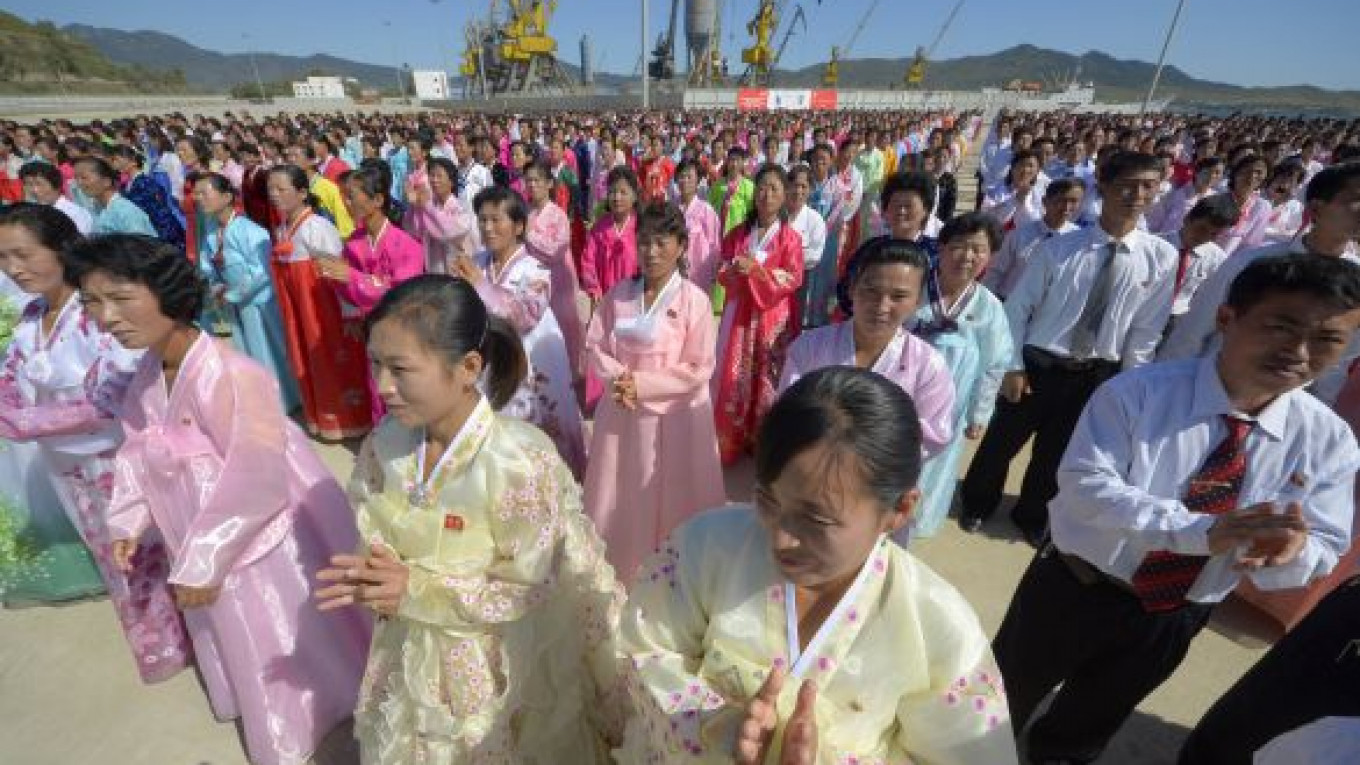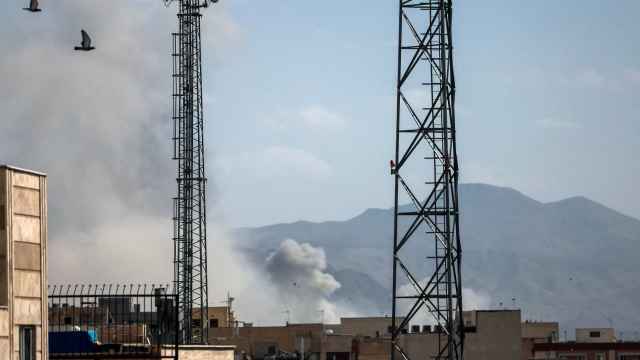Correction appended:
RAJIN, North Korea — Russia has opened an upgraded rail link with North Korea, a first step to re-animate the Trans-Korean Mainline, which could once again unite the two countries, but the question remains as to whether these changes can transform the Communist state that is still living the past.
Blazing a path for possible interaction by businessmen of other nations, Russian executives had mixed reactions to the experience of investing, building and running a project in North Korea.
“It was quite difficult to work here because of all these rules and regulations. After a month, the atmosphere seemed almost unbearable,” said Yury Loskutnikov, head of a Russian state company in North Korea that was involved in the construction works in the country.
But Aleksei Shvets, an RZhDstroi worker who was a Russian expat in North Korea for three years, rotating in and out on shifts while building the railroad, said he did not experience problems with the regime.
“You just have to follow certain rules, that is all,” he said.
A Korean Communist party member, standing near Shvets as he talked, smiled knowingly.
Visiting Russian dignitaries, along with a band of international journalists, who came for the opening ceremony, got firsthand exposure to the unique atmosphere the secretive nation offers.
Once the special “early sparrow” train heading to inspect the newly built rail line connecting Hasan on the Russian border and the North Korean port Rajin rolled across the border, it was met by a polite Korean customs officer.
“Computer? Camera? Telephone?” he inquires, quickly glancing around the train compartment.
Computers and cameras are written down in the customs declaration and allowed to enter the country. Cell phones are another story. We were told that if found, they might be confiscated by the customs. Most left them at Hasan station, the last outpost in Russia before the crossing. The mobile signal will be dead in North Korea anyway, as those brave enough to keep their phones soon find out.
The polite customs officer, speaking passable Russian, wishes us all the best, but bundles up and takes away our passports, to be returned on the way back. And so we enter one of the most closed countries in the world.
Alien Territory
As the train slowly rolls over the border passengers immediately fall under a spell and are taken back at least 70 years into the past. The sunlit country seen through the windows resembles theater decorations to a play that could have been set up in a pre-World War II Japan.
Corn, bean and rice fields, one-storey tile-roofed gray houses, with chimneys spewing smoke from burning coal or wood, are nestled among hills, rocks and the background drop of the sea.
Bright red and gray Russian Railways train cars, a common sight at any station back in Russia, glide along as if they were spaceships from another universe that came to inspect the activities of earthlings.
A woman is washing clothes in a stream. A man and a boy are patching up a clay fence. Another man is fishing with a wooden pole. Several men and women are laboring in a field.
The people, dressed in plain gray or brown uniform-style outfits, stop doing their chores to look and gaze, their eyes fixed on the passing train.
Although we were instructed not to take pictures, camera shutters are working like machine guns in an effort to document what seems to us like time travel.
The train moves further along the line, passing through dead stations devoid of people save for signalmen waving green flags. Aging train cars with dusty windows stand on the tracks, looking like leftovers from a time before the peninsula was divided. It seems like it’s been a long time since these rolled anywhere and that they will never move again, an impression that proves to be wrong later.
There are no motor vehicles on the roads except for old Japanese, Korean and Russian trucks. People mostly get around on bicycles and scooters.
The scenery has its own ascetic beauty. The hills, the sea, the people and their dwellings are all uniform, nothing stands out of the picture but numerous purple flowers that dot the horizon.
And then in the midst of this grayness comes an explosion of color and emotion. The train slows down and stops. Dozens of women in the traditional Korean dress called hanbok, made in all possible vivid colors, pass us smiling and waving. We have arrived at the rail link opening ceremony, which for the occasion has been officially labeled “a meeting.”
The Connection
Talks of plans to reconstruct the 50-kilometer stretch of the railroad from the Russian border to the Rajin port and to improve its infrastructure have been going on between the two transportation ministries since 2001.
After the final decision, which was made in 2008, it took three years and about 9 billion rubles ($283 million) of unilateral investment from Russia to build the railroad almost from scratch and to modernize the old port, which can now take in large freight vessels.
Russian Railways subsidiary RZhD-stroi did the construction work on both sides of the border. A joint venture between the monopoly and the North Korean Transportation Ministry, RasonConTrans, will be the logistics operator on the line.
“Prior to the reconstruction, passenger trains ran there several times per week, but I do not know how they managed to avoid accidents as the railroad was in very bad shape,” RzhD-stroi’s Shvets said.
The railroad and port infrastructure reconstruction was supervised by Russian engineers and mostly built by Russian workers. Koreans largely contributed with unskilled labor.
The port in Rajin will at first handle coal freight coming from Russia by rail to be transshipped to China, South Korea and other neighboring Asian countries. Further plans are to upgrade and equip it to be able to provide container services.
“The rail line and the port shipment capacity are suitable for coal exports because it is the shortest route from coal-mining regions in Russia to Asian ports,” said Russian Railways chief Vladimir Yakunin, who was present at the ceremony and unveiled a commemorative plaque, adding that the existing capacity of alternative ports in Russia’s Far East is limited.
Current load capacity of port Rajin is 4 million tons of coal per year. But because the facilities and the new route need to be tested, the plan for next year is to transport only 1.2 million tons of coal, a source at RasonConTrans said.
So far the only major customer for the new route announced is metal and mining giant Mechel.
The next step, proposed by Russian Railways, is to reanimate the Trans-Korean Mainline, which stopped operating in 1950 as the war between the two Koreas approached.
“Our joint task is to make this rail section and the port a trial project to further develop a restored North and South Korean united transportation link that would connect the peninsula and the neighboring countries, and them with Europe and Russia through the Trans-Siberian Railroad,” Yakunin said.
Doing Business' Climate
While railway and government officials are optimistic about their plans, doing business in North Korea has never been easy.
The area around Rajin free economic zone and was established in 1991. Any country, including South Korea, is permitted to trade and set up production facilities there, which could be an attractive proposition for all neighbors.
But the business atmosphere is frequently polluted by general saber rattling and specific missile launch threats. The last one came earlier this year, followed by South Korea calling home its workers from another special zone – the Kaesong production complex at the border between the two countries that employs staff from both Koreas.
Experts on North Korea view the new leader, Kim Jong-un, as being milder than his late predecessors, which is also evident from better press relations.
“Back in 2008, it was prohibited to take pictures of people in uniform, but today it seems to be allowed, although the rule-bending is unspoken,” said Yury Maltsev, a photographer with the Vladivostok branch of Novaya Gazeta.
But the regime has not changed considerably.
The rules included not allowing journalists to wander too far from the ceremony stage. Attempts to move even a few hundred meters from the spot were met with a polite but firm guiding gesture back to where the event was in progress.
Having no other means of communication with foreigners than gestures, a soldier put his hands to his eyes as if holding binoculars, then made an ‘X’in the air. The message was clear: “No poking around.”
As the press train rolled away from the fairytale event, lone plain clothes security men, pretending they were just enjoying the scenery or a smoke, stood at regular intervals along the rail line watching out for intruders.
It was not clear if they would still be standing there when the status quo changes for good and thousands of trains with coal and containers start streaming across the border heading for more distant lands.
Correction: In an earlier version of this story, The Moscow Times referred to North Korea's new leader as Kim Jon-il. The new leader is Kim Jong-un, Kim Jong-il's son.
Contact the author at [email protected]
A Message from The Moscow Times:
Dear readers,
We are facing unprecedented challenges. Russia's Prosecutor General's Office has designated The Moscow Times as an "undesirable" organization, criminalizing our work and putting our staff at risk of prosecution. This follows our earlier unjust labeling as a "foreign agent."
These actions are direct attempts to silence independent journalism in Russia. The authorities claim our work "discredits the decisions of the Russian leadership." We see things differently: we strive to provide accurate, unbiased reporting on Russia.
We, the journalists of The Moscow Times, refuse to be silenced. But to continue our work, we need your help.
Your support, no matter how small, makes a world of difference. If you can, please support us monthly starting from just $2. It's quick to set up, and every contribution makes a significant impact.
By supporting The Moscow Times, you're defending open, independent journalism in the face of repression. Thank you for standing with us.
Remind me later.






